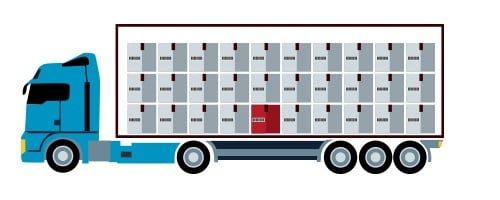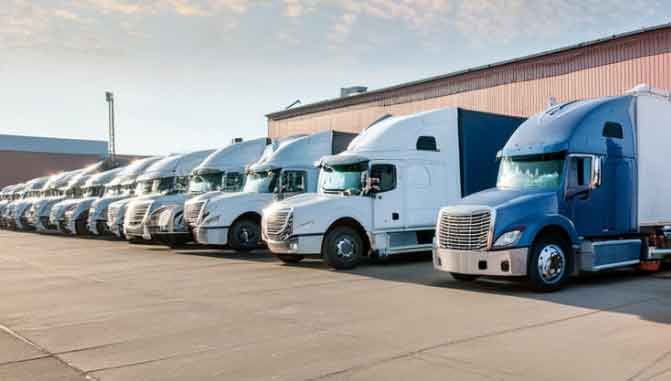Shippers’ LTL Freight Guide: Carrier Selection and Practices
LTL Freight: Everything Shippers Need to Know
Less Than Truckload (LTL) freight plays a vital role in transporting goods efficiently and cost-effectively. LTL freight offers a solution for shippers who have smaller shipments that don't require a full truckload. This comprehensive guide aims to provide clarity on routing LTL freight and provide shippers with all the essential information they need to know to navigate this logistics mode effectively.

What is LTL?
LTL freight, also known as Less Than Truckload freight, refers to a shipping method where multiple shippers' goods are consolidated onto a single truck trailer for transportation. Unlike Full Truckload (FTL) shipments, which occupy the entire trailer, LTL shipments typically occupy only a portion of the available space.
In LTL freight, carriers combine multiple smaller shipments from different shippers into one load, optimizing the use of truck capacity. This consolidation allows shippers to share transportation costs, making it a cost-effective option for shipping smaller loads that don't require a full truck.
LTL freight is commonly used when the shipment's weight or volume is too large for parcel carriers but not enough to fill an entire truck. This method is widely employed in various industries, including manufacturing, retail, e-commerce, and distribution.
LTL carriers have well-established networks and scheduled routes that cover a wide geographical area. They operate hubs and terminals where shipments are sorted, consolidated, and transferred to different trucks for final delivery. These carriers provide services that range from pickup at the shipper's location to delivery at the consignee's destination.
LTL freight offers several advantages for shippers. It allows businesses to access cost savings by sharing transportation expenses, reduces the risk of damage through specialized handling procedures, and provides flexibility in shipping smaller quantities. Additionally, LTL carriers often offer value-added LTL accessorial services such as liftgate assistance, inside delivery, and notification services for enhanced convenience and customer satisfaction.
To effectively utilize LTL freight, shippers need to understand dimension calculation, freight class determination, packaging requirements, documentation, and the process of obtaining accurate freight quotes. By familiarizing themselves with LTL shipping practices and selecting reputable carriers, shippers can optimize their logistics operations and achieve efficient and reliable transportation of their goods.
Understanding LTL Freight:
- Definition: LTL freight refers to shipments that do not occupy an entire truck trailer but share space with other shippers' goods.
- Consolidation: LTL carriers consolidate multiple small shipments into a single truckload to maximize efficiency.
- Cost Efficiency: Shippers only pay for the space their shipment occupies, making it cost-effective for smaller loads.
Benefits of LTL Freight:
- Cost Savings: Shippers can save money by sharing transportation costs with other businesses.
- Flexibility: LTL freight accommodates smaller shipments and allows for partial truckload shipments.
- Reduced Risk: LTL carriers are experienced in handling and securing partial loads, minimizing the risk of damage.
- Expanded Reach: LTL carriers provide extensive coverage, enabling shipments to reach various destinations.
Key Terminology in LTL Freight:
- Freight Class: A standardized classification system used to determine shipping rates based on an item's characteristics.
- Bill of Lading (BOL): A legal document that serves as a contract between the shipper and carrier, detailing the shipment's specifics.
- Accessorial Charges: Additional fees incurred for services such as liftgate assistance, inside delivery, or residential delivery.
Choosing an LTL Carrier:
- Reputation and Reliability: Research carriers' track records, customer reviews, and service levels to ensure reliable delivery.
- Service Coverage: Verify if the carrier offers services in the desired shipping locations.
- Transit Time: Evaluate the carrier's estimated transit times to align with your business requirements.
- Tracking and Visibility: Opt for carriers that provide real-time shipment tracking and visibility for better supply chain management.
LTL Packaging and Freight Preparation:
- Proper Packaging: Securely package goods to withstand the rigors of LTL transportation, minimizing the risk of damage.
- Labeling and Documentation: Clearly label each shipment with relevant information and ensure accurate and complete documentation.
- Freight Class Determination: Understand how freight class is assigned based on factors such as weight, dimensions, density, and product type.
Freight Pricing and Quoting:
- Freight Rates: Understand the factors that influence LTL rates, including freight class, weight, distance, and accessorials.
- Quoting Process: Request quotes from multiple carriers, comparing rates, services, and transit times to make informed decisions.
Efficient LTL Shipping Practices:
- Communication: Maintain open lines of communication with carriers, providing accurate and timely information about shipments.
- Freight Consolidation: Strategically consolidate shipments to maximize efficiency and minimize costs.
- Transit Time Expectations: Set realistic expectations for transit times and communicate them to customers.
LTL freight presents an attractive solution for shippers with smaller shipments, offering cost savings, flexibility, and reliable transportation services. By understanding the fundamentals of LTL freight, selecting the right carrier, preparing shipments properly, and implementing efficient shipping practices, shippers can optimize their logistics operations and ensure seamless deliveries.
TLI Insights
Get the latest logistics insights and tips from TLI's award-winning team. Stay ahead in transportation planning.
Questions? Email us at marketing@shiptli.com




